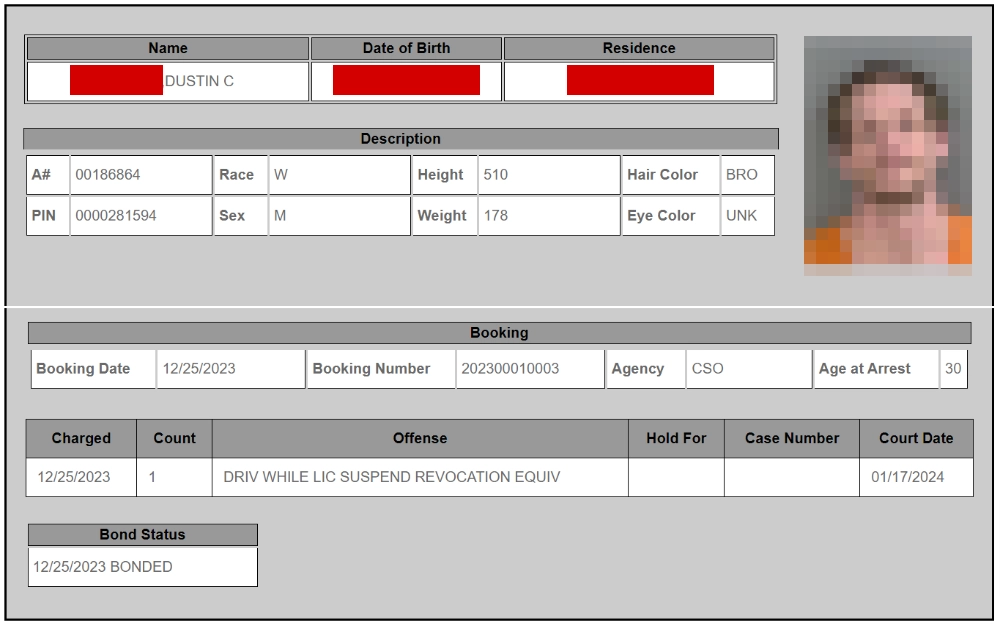Collier County Arrest: A Comprehensive Guide To Understanding The Process And Legal Implications
Collier County arrest is a critical topic that involves understanding the legal procedures and implications for both individuals and communities. If you or someone you know has been involved in an arrest in Collier County, it's essential to grasp the steps, rights, and responsibilities that come into play. This guide will provide you with a detailed breakdown of everything you need to know about arrests in Collier County, from the initial process to post-arrest procedures.
Arrests in Collier County, Florida, are governed by strict legal protocols designed to protect individual rights while ensuring public safety. Whether it's a minor offense or a more serious crime, understanding the legal framework and procedures can make a significant difference in navigating this challenging situation.
This article will explore the intricacies of Collier County arrest procedures, the role of law enforcement, and the importance of legal representation. By the end of this guide, you'll have a clearer understanding of what to expect and how to handle an arrest situation effectively.
Read also:July 16 Birthdays Celebrating The Lives Of Remarkable People
Table of Contents
- What is a Collier County Arrest?
- Arrest Process in Collier County
- Rights During an Arrest
- Common Reasons for Arrest
- Bail and Bond Process
- Post-Arrest Procedures
- Role of Law Enforcement
- Legal Representations
- Community Impact
- Conclusion
What is a Collier County Arrest?
Understanding what constitutes a Collier County arrest is crucial for anyone living or visiting the area. An arrest occurs when law enforcement officers take an individual into custody, typically due to suspicion of committing a crime. In Collier County, arrests are conducted in accordance with Florida state laws and local ordinances.
Definition and Legal Framework
Under Florida law, an arrest involves the deprivation of an individual's freedom of movement. Law enforcement officers in Collier County must adhere to specific protocols to ensure that arrests are lawful and based on probable cause. This includes obtaining warrants when necessary and following proper procedures during the arrest.
Importance of Knowing Your Rights
Being aware of your rights during an arrest is vital. The Fourth Amendment to the U.S. Constitution protects individuals from unreasonable searches and seizures, and the Fifth and Sixth Amendments guarantee the right to remain silent and the right to legal counsel. These rights are particularly important in Collier County, where the legal system emphasizes fair treatment for all individuals.
Arrest Process in Collier County
The arrest process in Collier County follows a structured sequence of events designed to ensure that legal standards are met. Understanding these steps can help individuals prepare for what to expect during an arrest.
Initial Contact
The arrest process begins with an initial contact between law enforcement officers and the individual suspected of committing a crime. During this phase, officers assess the situation and determine whether there is probable cause to make an arrest. This may involve questioning the suspect or conducting a search if a warrant is present.
Taking Custody
Once probable cause is established, officers will take the individual into custody. This involves physically restraining the suspect and transporting them to a detention facility. During this stage, officers must inform the suspect of their Miranda rights, which include the right to remain silent and the right to an attorney.
Read also:April 16 Birthdays Celebrating The Lives And Achievements Of Remarkable Individuals
Booking Process
After arriving at the detention facility, the suspect undergoes the booking process. This involves recording personal information, taking fingerprints and photographs, and conducting a background check. The booking process is a critical step in documenting the arrest and ensuring accurate records are maintained.
Rights During an Arrest
Knowing your rights during an arrest is essential for protecting yourself and ensuring that your legal rights are upheld. In Collier County, individuals have specific rights that must be respected by law enforcement officers.
Miranda Rights
The Miranda warning is a critical component of the arrest process. Officers must inform suspects of their right to remain silent and the right to an attorney. This warning ensures that individuals are aware of their rights and can make informed decisions about their interactions with law enforcement.
Right to Legal Counsel
Every individual has the right to legal representation during an arrest. If you cannot afford an attorney, the court will appoint one for you. Having legal counsel is crucial for navigating the complexities of the legal system and ensuring that your rights are protected.
Common Reasons for Arrest in Collier County
Arrests in Collier County can occur for a variety of reasons, ranging from minor offenses to serious crimes. Understanding the common reasons for arrest can help individuals avoid situations that may lead to legal trouble.
- Traffic Violations: Minor traffic offenses, such as speeding or running a red light, can result in citations or arrests if the individual refuses to comply with law enforcement.
- Drug-Related Offenses: Possession, distribution, or manufacturing of illegal substances are serious crimes that often lead to arrests in Collier County.
- Domestic Violence: Allegations of domestic violence are taken seriously, and law enforcement officers may make an arrest even if the victim does not wish to press charges.
- Theft and Burglary: Theft-related crimes, including shoplifting and burglary, are common reasons for arrests in the area.
Bail and Bond Process
After an arrest, individuals may be eligible for release on bail or bond. The bail and bond process in Collier County involves setting a monetary amount that must be paid to secure release from custody.
Setting Bail Amount
The amount of bail is determined by a judge based on factors such as the severity of the crime, the defendant's criminal history, and the likelihood of flight. In some cases, individuals may be released on their own recognizance without the need for bail.
Types of Bonds
There are several types of bonds available in Collier County, including cash bonds, surety bonds, and property bonds. Each type has its own requirements and conditions, so it's important to consult with a legal professional to determine the best option.
Post-Arrest Procedures
Following an arrest, several legal procedures must be followed to ensure that the case is handled appropriately. These procedures include arraignment, preliminary hearings, and trial preparation.
Arraignment
At the arraignment, the defendant is formally charged with the crime and enters a plea of guilty, not guilty, or no contest. This is a critical step in the legal process, as it sets the stage for further proceedings.
Preliminary Hearings
Preliminary hearings are held to determine whether there is sufficient evidence to proceed to trial. During this stage, both the prosecution and defense present their cases, and the judge decides whether the case should move forward.
Role of Law Enforcement
Law enforcement officers play a crucial role in the arrest process in Collier County. Their responsibilities include investigating crimes, making arrests, and ensuring that legal procedures are followed.
Training and Protocols
Officers in Collier County undergo extensive training to prepare them for the challenges of law enforcement. This includes learning about constitutional rights, proper arrest procedures, and the use of force. Adherence to these protocols is essential for maintaining public trust and ensuring fair treatment for all individuals.
Community Engagement
Law enforcement agencies in Collier County actively engage with the community to build trust and improve relations. This includes hosting community events, conducting outreach programs, and soliciting feedback from residents.
Legal Representations
Hiring a competent legal representative is crucial for anyone facing an arrest in Collier County. A skilled attorney can provide guidance, negotiate plea deals, and represent the individual in court.
Choosing the Right Attorney
When selecting a lawyer, it's important to consider factors such as experience, reputation, and specialization. Attorneys who specialize in criminal defense are particularly well-suited to handle arrest cases in Collier County.
Legal Strategies
Legal strategies may include filing motions to dismiss charges, challenging the legality of the arrest, or negotiating plea agreements. A skilled attorney will develop a tailored strategy based on the specifics of the case and the client's goals.
Community Impact
Arrests in Collier County have a significant impact on both individuals and the community as a whole. Understanding the broader implications of arrests can help foster a safer and more equitable society.
Rehabilitation and Support
Rehabilitation programs and support services are available to help individuals reintegrate into the community after an arrest. These programs focus on addressing the root causes of criminal behavior and providing resources for personal growth and development.
Public Safety Initiatives
Collier County invests in public safety initiatives aimed at reducing crime and improving community well-being. These initiatives include increasing police presence, implementing crime prevention programs, and fostering collaboration between law enforcement and community organizations.
Conclusion
In conclusion, understanding the Collier County arrest process is essential for anyone involved in or affected by the legal system. From the initial arrest to post-arrest procedures, each step plays a critical role in ensuring justice and protecting individual rights. By staying informed and seeking legal representation when needed, individuals can navigate the complexities of the legal system with confidence.
We encourage you to share this article with others who may benefit from the information provided. If you have any questions or comments, please feel free to leave them below. Additionally, explore our other resources for further insights into legal matters in Collier County.
Data Source: Collier County Sheriff's Office


